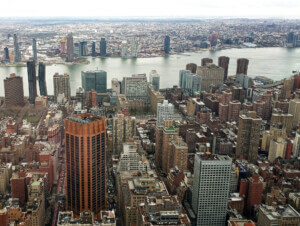On a recent company conference call, real estate developer Vornado confirmed it is pausing its plan to redevelop the blocks surrounding Penn Station into Penn District. Vornado President and CFO Michael Franco shared that the company expects to face more favorable market conditions in two or three years. On the call, Vornado execs anticipated that this year will be difficult “due to depressed leasing and scarce capital.”
The news was not a surprise to those following the saga of the project and eyeing the plight of the commercial real estate market. Last November, Vornado CEO Steven Roth told investors that “the headwinds in the current environment are not at all conducive to ground-up development.” At the time, an analyst speculated that the project is “certainly delayed” due to reduced interest in office space.
Vornado, New York City’s second-largest owner of commercial real estate, is also making changes to other properties, as well. Crain’s New York reported that the company is “lowering rents to retain retail tenants in Times Square and may further write down the value of a Midtown portfolio that’s already been reduced by nearly 30 percent.”
The news arrives amid wider studies of reduced office occupancy and related spending. Analysis by Bloomberg News shows that “the average worker is spending $4,661 less per year on meals, shopping, and entertainment near their offices in New York” and that overall, “Manhattan workers are spending at least $12.4 billion less a year due to about 30 percent fewer days in the office.” Reporting by Emma Court and Donna Borak paints a picture of today’s vacant office life: Desks are largely empty at the start and end of the work week, and executive use of car services is now focused on Tuesday, Wednesday, and Thursday. A potential 40 percent drop in the value of office buildings due to their partial occupation could “cost $5 billion in lost tax revenue, or five percent of the city’s annual budget,” according to researchers. Even the fast-casual salad favorite Sweetgreen is feeling the burn: In a call last November, Sweetgreen Cofounder and CEO Jonathan Neman said that while “the start and end of the week used to be its strongest sales days,” this is no longer the case.
On the recent Vornado call, there was a graver pronouncement: “You can assume that Friday is dead forever,” Roth mused. “Monday is touch and go.”
Another element in the battle for the future of Penn Station is the public resistance to the effort led by Governor Kathy Hochul to redevelop the area, a move that would largely enrich Vornado due to its holdings in and around the transit hub. Last October, a lawsuit was filed by Penn Community Defense Fund (PCDF) that challenged the plan put forth by the Empire State Development Corporation. As reported in AN, “[the] central claim of PCDF’s lawsuit is that the State’s environmental review for the Penn Station master plan was illegally ‘segmented’ and that the State sidestepped the Uniform Land Use and Review Procedures by declaring the area around Penn Station ‘blighted.’” The goal, as stated by Sam Turvey, a coordinator in the PCDF and chairperson at ReThinkNYC, is for the project plan to be declared illegal so that “better alternatives can be presented and debated by the public utilizing the proper review processes.”
Organized opposition to the Penn District continues. At a late January event at Cooper Union hosted by ReThink PennStation NYC, architects presented three visions for how to improve (or restore) the regional hub. While they varied in style and strategy, it was clear that there is a public appetite for better transportation and urbanism solutions. As stated in a comment by Gina Pollara at the event, the most urgent issue is the expiration of Madison Square Garden’s permit to host events with more than 2,500 people; the license will expire on July 24. Previously the facility held a 50-year agreement, but when it was last renewed, the duration was shortened in part to encourage its owner, MSG Entertainment, “to use that time to find a new home for the arena,” according to The New York Times. Last week, the company announced it will seek a special permit that allows the arena’s operation in perpetuity. The (re)location of the arena is a central component in ongoing discussions about how to update the busiest passenger rail transit facility in the Western Hemisphere.
For both Vornado’s Penn District and the future of Madison Square Garden, the shot clock is ticking.











